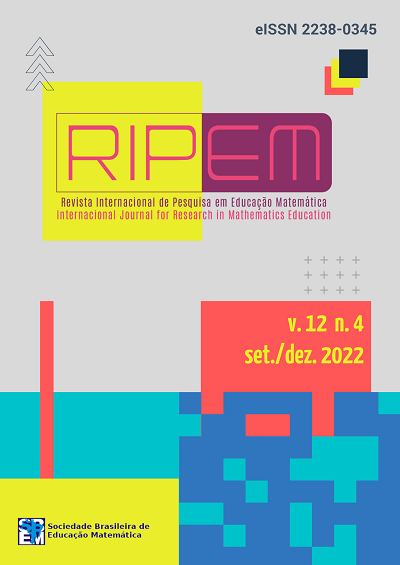For an algorithmic-normative pan-turn in School Mathematics Education
DOI:
https://doi.org/10.37001/ripem.v12i4.3214Keywords:
School Mathematics Education, Deconstruction, Algorithmic-Normative Pan-Turn, Ludwig Wittgenstein, Alan TuringAbstract
Not only the pandemic, but also the global environmental crisis can lead to the extinction of human life on the planet. The challenge presented to school mathematics education that has been practiced globally, since the advent of modern systems of public schooling, is to deconstruct itself as a “whig-colonizing” education. In this article, based on the algorithmic-normative image of mathematical activity suggested by the works of Alan Turing and Ludwig Wittgenstein, we will discuss a possible way of carrying out this deconstruction, as well as a possible way for this deconstructed mathematics education to come to participate in the invention of a global non-disciplinary school pan-education, what requires from school practices a focal displacement of fixed and sequenced disciplinary contents to problematize the effects and affections of the realization of algorithmic-normative cultural practices on different vital fields of human activity.
Downloads
References
Chace, A. B. (1979). The Rhind Mathematical Papyrus: free translation and commentary with selected photographs, transcriptions and literal translations. Reston, Virginia: The National Council of Teachers of Mathematics. Association Drive.
Credit Suisse. (2020). Global Wealth Report 2020. Research Institute. DisponÃvel em https://www.credit-suisse.com/about-us/en/reports-research/global-wealth-report.html?aa=rl-onsite-search.
Euclides. (2009). Os Elementos. Tradução e Introdução de I. Bicudo. São Paulo, SP: Editora da UNESP.
Heron de Alexandria. (1899). Druckwerke Und Aütomatentheater. Griechisch Und Deutsch Herausgegeben Wilhelm Schmidt. Leipzig: Druck und Verlag von B. G. Teubner.
Kliass, P. (2021). Retrato da concentração de riqueza na pandemia. Blog Outras Palavras. DisponÃvel em https://outraspalavras.net/mercadovsdemocracia/retrato-da-concentracao-de-riqueza-na-pandemia/.
Miguel, A. (2021). O que é mesmo fazer história da educação matemática? In: L. S. Gutierre (Org.). (Re)encontros de Pesquisa em História da Educação Matemática. (1a. ed. eletrônica, pp. 21-90). Natal, RN: EdUFRN.
Miguel, A. Tamayo, C. (2020). Wittgenstein, terapia e educação escolar decolonial. Educação & Realidade, v. 45, n. 3, pp. 1-40.
Miguel, A.; Vianna, C. R.; Corrêa, J. F. (2020). Uma apresentação panorâmica da fisiognomia de uma historiografia terapêutica. In: A. Miguel; C. R. Vianna; J. F. Corrêa (Orgs.). Uma historiografia terapêutica de acasos. (1ª. Ed. eletrônica, pp. 15-105). Uberlândia, MG: Navegando Publicações.
Schmidhuber, J. (2021). Turing Oversold. AI Blog@SchmidhuberAI. DisponÃvel em https://people.idsia.ch/~juergen/turing-oversold.html.
Turing, A. M. (1936). On computable numbers, with an application to the entscheidungs problem. Proceedings of the London Mathematical Society, 42, pp. 230-267.
Ventura, D. (2018). Cómo eran los robots y los cines que ya existÃan en la antigua Grecia. DisponÃvel em https://www.bbc.com/mundo/noticias-42887596.
Wittgenstein, L. (2021). Observações sobre os fundamentos da matemática / Bemerkungen über die grundlagen der mathematik. (Edição bilingue Alemão/Português. Tradução, Apresentação e Notas por J. J. R. L. Almeida). Campinas, SP: Editora hörle.
Wittgenstein, L. (2017). Philosophische Untersuchungen/Investigações filosóficas. Translation by J. J. R. L. Almeida. BilÃngue edição Ger-Port. DisponÃvel em: http://www.psicanaliseefilosofia.com.br/textos/InvestigacoesFilosoficas-Original.pdf.
Published
How to Cite
Issue
Section

This work is licensed under a Creative Commons Attribution-NonCommercial-ShareAlike 4.0 International License.








